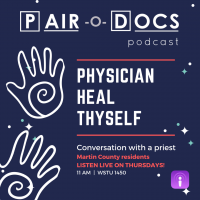Pair-O-Docs Podcast Episode 24: Physician Heal Thyself
The docs talk with Father Christian Anderson about spirituality and the power of prayer

The docs talk with Father Christian Anderson about spirituality and the power of prayer

The Docs talk with area hospice professionals about the wide array of services they offer dying patients and their families.

The Docs talk to renowned psychiatrist Dr. Perry Mandanis about the power of a good story and how it could make all the difference in your life. Dr Ira rants about the trend of Physician bashing and reviews the article Read More…

This week, Dr. Ira Pearlstine and Dr. Leighan Talton discuss diabetes.

Dr. Ira Pearlstine and Dr. Leighan Talton introduce themselves, and let viewers know what to expect over the next few weeks!
What are the benefits of concierge medicine?
The benefits of concierge medicine include personalized care, enhanced access to healthcare services, and longer appointment times, allowing for thorough consultations. This model fosters a strong doctor-patient relationship, ensuring patients receive tailored health management.
How does concierge medicine differ from traditional care?
Concierge medicine differs from traditional care by offering personalized, accessible healthcare services through a membership model, allowing for longer visit times, enhanced doctor-patient relationships, and more direct communication, which contrasts with the often rushed and impersonal nature of traditional healthcare settings.
Who can benefit most from concierge medicine?
Concierge medicine can benefit individuals seeking personalized healthcare, those with chronic conditions needing consistent management, busy professionals desiring streamlined access to care, and patients valuing close relationships with their physicians for better health outcomes.
What services are typically included in concierge medicine?
Concierge medicine typically includes personalized healthcare services such as same-day or next-day appointments, extended consultation times, 24/7 access to physicians, wellness and preventive care, streamlined referrals to specialists, and comprehensive health assessments tailored to individual needs.
How do I choose a concierge doctor?
Choosing a concierge doctor involves identifying a physician who aligns with your healthcare needs, values personalized care, and has a good reputation. Consider their experience, availability, and approach to patient relationships to ensure the best fit for your health journey.
What factors influence concierge medicine fees?
The factors that influence concierge medicine fees include the level of personalized care provided, the range of services offered, location, the physician's experience and reputation, and operational costs associated with maintaining the practice.